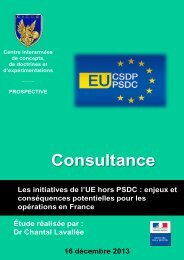Conference
science-research-bulletin-2013-conference
science-research-bulletin-2013-conference
You also want an ePaper? Increase the reach of your titles
YUMPU automatically turns print PDFs into web optimized ePapers that Google loves.
EUROPEAN POLICE SCIENCE AND RESEARCH BULLETIN<br />
SPECIAL CONFERENCE EDITION<br />
investigations into alleged incidents in certain<br />
circumstances, even where no formal complaint<br />
has been lodged. Equally, they can be authorised<br />
to investigate systemic issues that are generating<br />
complaints. On the other hand, their role does<br />
not extend beyond investigation and report,<br />
even with respect to individual complaints. In<br />
those cases where they uphold a complaint, it<br />
is a matter for the independent prosecutor to<br />
decide whether to prefer criminal charges, and/<br />
or for the chief of police to decide whether to<br />
prefer disciplinary charges. If criminal charges<br />
are preferred, they will be determined through<br />
the independent courts in the same manner as<br />
any other criminal charge. If disciplinary charges<br />
are preferred they are determined through<br />
the internal police disciplinary process. The<br />
Ombudsman or Commissions have no direct role<br />
in these matters or their outcome.<br />
It should be noted that these powers of<br />
independent investigation, where applicable,<br />
are generally in addition to the role of the<br />
Commissions in reviewing, supervising and<br />
managing the investigation of complaints which<br />
are not handled in this manner.<br />
Superficially, the current arrangements satisfy<br />
the ECHR standards, although there may be<br />
some doubt over the lack of independence in<br />
the final determination of criminal or disciplinary<br />
charges arising out of deaths or serious injuries.<br />
The opinion of the European Commissioner on<br />
Human Rights acknowledges that the established<br />
working relationship between the police and<br />
the independent public prosecutor may give<br />
rise to the appearance of bias in favour of the<br />
police in complaints cases. Accordingly, the<br />
opinion recommends an arrangement whereby<br />
the independent ombudsman/commission can<br />
prefer criminal charges (Hammerburg, 2009).<br />
Surprisingly, no mention is made in the opinion<br />
of the more obvious lack of independence in the<br />
decision whether to prefer disciplinary charges<br />
(which remains with the police). However, it<br />
does state that the independent prosecutor,<br />
police and/or ombudsman commission should<br />
give reasons for all decisions on criminal or<br />
disciplinary matters (Hammerburg, 2009). Each<br />
of the four jurisdictions remains particularly weak<br />
on this aspect.<br />
ONGOING CONCERNS<br />
In the historical context of police complaints<br />
procedures in Britain and Ireland, the latest<br />
reforms appear quite radical. In practice,<br />
however, they have continued to disappoint. The<br />
rate of successful complaints remains pitifully and<br />
unrealistically low. In the Republic of Ireland, less<br />
than 3 % of complaints result in a recommendation<br />
for some form of criminal or disciplinary action.<br />
In Northern Ireland, the figure is 5 %. In England<br />
and Wales, the figure is 12 %, while in Scotland<br />
it is 13 %. It should be noted that these figures<br />
only represent recommendations. The actual<br />
number of complaints that result in some form<br />
of criminal or disciplinary sanction is much lower.<br />
Not surprisingly, therefore, the capacity of the<br />
independent procedures to deliver confidence<br />
in the investigation of complaints has been the<br />
subject of recent and sustained criticism in at least<br />
three of the four jurisdictions. In some instances<br />
the criticisms are led by the independent bodies<br />
themselves.<br />
In 2012, for example, the Home Affairs Committee<br />
(HAC) of the United Kingdom Parliament<br />
conducted hearings into the operation of the<br />
independent Commission in response to sustained<br />
expressions of public concern. In a highly critical<br />
report published in 2013, it concluded that the<br />
Commission ‘is not yet capable of delivering<br />
the kind of powerful, objective scrutiny that is<br />
needed to inspire [public] confidence’ that police<br />
powers will not be abused (HAC 2013, para. 4).<br />
Earlier, in 2008, over 100 lawyers with expertise<br />
in police complaints resigned from the IPCC’s<br />
advisory body citing a range of criticisms of<br />
the IPCC, including bias in favour of the police<br />
(Davies, 2008). In the 10 years up to the death<br />
of Ian Tomlinson, an innocent newspaper vendor<br />
who died of a heart attack after being struck by<br />
a police officer at the scene of the ‘G20 Summit<br />
protest’ in London in 2009, there had been<br />
400 deaths following police contact. The IPCC<br />
is obliged to investigate such cases (Economist,<br />
2009). Nevertheless, not one of them has ever<br />
resulted in the conviction of a police officer for<br />
murder or manslaughter; including in the Ian<br />
Tomlinson case itself where the inquest jury<br />
returned a verdict of unlawful killing.<br />
In the Republic of Ireland in 2013, frustration<br />
within the independent Ombudsman<br />
Commission, over its failure to investigate<br />
certain complaints expeditiously, boiled over in<br />
the form of a public row between it and senior<br />
51





